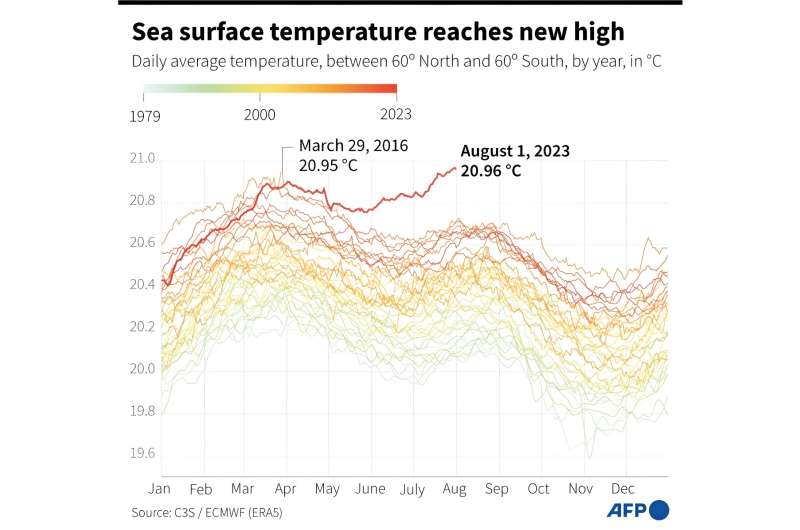This article has been reviewed according to Science X's editorial process and policies. Editors have highlighted the following attributes while ensuring the content's credibility:
fact-checked
reputable news agency
proofread
World's oceans set new surface temperature record: EU monitor

The world's oceans set a new temperature record this week, raising concerns about knock-on effects on the planet's climate, marine life and coastal communities.
The temperature of the oceans' surface rose to 20.96 degrees Celsius (69.7 degrees Fahrenheit) on July 30, according to European Union climate observatory data.
The previous record was 20.95 C in March 2016, a spokeswoman for the EU's Copernicus Climate Change Service told AFP on Friday.
The samples tested excluded polar regions.
The US National Oceanic and Atmospheric Administration (NOAA), which uses a different database, has also recorded a similar trend in recent months.
It said the average sea surface temperature record was reached on April 4 this year at 21.06 C, overtaking the previous high of 21.01 C in March 2016. On August 1, average temperatures were at 21.03 C, it said.
Oceans have absorbed 90 percent of the excess heat produced by human activity since the dawn of the industrial age, according to scientists.
This excess heat continues to accumulate as greenhouse gases—mainly from burning oil, gas and coal—build up in the Earth's atmosphere.
Globally, the average ocean temperature has been topping seasonal heat records on a regular basis since April.
'Immediate threat'
"The ocean heat wave is an immediate threat to some marine life," said Piers Forster of the International Center for Climate at Britain's University of Leeds.
"We are already seeing coral bleaching in Florida as a direct result and I expect more impacts will surface."
The overheating of the oceans is predicted to have other effects on marine plant and animal life too, including on the migration of certain species and the spread of invasive species.
This could threaten fish stocks and thus undermine food security in certain parts of the globe.

Warmer oceans are also less capable of absorbing carbon dioxide (CO2), reinforcing the vicious cycle of global warming.
And higher temperatures are likely to come, since the El Niño phenomenon, which tends to warm waters up, has only just begun.
Scientists expect the worst effects of the current El Niño to be felt at the end of 2023 and continue into subsequent years.
Like bath water
"While there are certainly short-term factors, the main long-term cause is without a doubt the accumulation of greenhouse gases in the atmosphere caused by human activity, primarily by the burning of fossil fuels," said Rowan Sutton, director of climate research at the University of Reading.
The latest figures follow a string of record highs around the world.
Last month, temperatures of 38.3 C—as hot as a jacuzzi—were recorded off the Florida coast, which could be a world-record high for a point measurement if the figure is confirmed.
The surface waters of the North Atlantic rose to a record-high average temperature of 24.9 C last week, according to provisional data from the NOAA.
The North Atlantic usually only reaches its peak temperature in September.
Since March, the month when the North Atlantic begins to warm up after winter, temperatures have been higher than in previous years and the gap with past records has continued to widen in recent weeks.
The region has become a key point for observing the heating of the world's oceans.
In July, the Mediterranean Sea broke its daily heat record, with a median temperature of 28.71 C, according to Spain's leading maritime research center.
Marine heat waves have become twice as frequent since 1982, according to a 2019 report by the Intergovernmental Panel on Climate Change (IPCC).
By 2100, they could be 10 times more intense than they were at the beginning of the 20th century if pollutant emissions are not reduced.
The use of coal, oil and gas is expected to be at the center of debates in the upcoming United Nations climate talks, dubbed COP28, scheduled to take place at the end of the year in Dubai.
© 2023 AFP





















